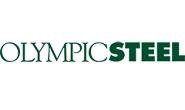Market Segment

August 3, 2017
Olympic Gains Market Share in Strong Second Quarter
Written by Sandy Williams
Olympic Steel celebrated a particularly strong second quarter. Net sales jumped 30 percent year-over-year to $356.2 million on higher shipping volume and selling prices. Net income grew 35 percent for the quarter to $4.8 million.
Carbon flat product sales increased 37 percent to $237 million from Q2 2016 sales of $173 million. Shipments increased 13 percent year-over-year to 308,468 tons from 272,447 tons, triple the MSCI average of 3.75 percent. Average selling price for carbon flat products was $769 per ton, up from $635 per ton a year ago. Specialty and Tubular sales also increased significantly during the quarter with all three segments achieving record market share. the company said.
End markets are continuing to improve said CEO Michael Siegal, noting that customers expect to remain busy for the remainder of the year.
“The 232 decision, which may or may not be forthcoming, has been a focus of much discussion in the industry and has created much of the recent volatility in steel pricing,” said Siegal. “However, until something definitive is announced, it is all just noise and talk. The real story is the improvement in underlying fundamentals from recovering demand around the world. Scrap prices have been increasing and iron ore prices have also rebounded due to demand in China, Europe and, of course, the United States.
President Dave Wolfort added that Olympic Steel has seen a resurgence in the agricultural and construction markets. Both were flat last year, but gained momentum at the end of 2016 and into the first half of 2017. Olympic’s orders from OEMs and automotive continue to be strong.
The significant improvement in flat carbon sales were the result of higher demand, said Wolfort. “Most of our large OEMS have been significantly busy, and the second tier support for that has been busier,” he said. “We saw automotive do fairly well for us, particularly in first quarter and in second quarter with the advent of us supplying some aluminum.”
Asked about inflationary pressure, Siegal said he expects higher health care costs and wage increases due to a catch-up in wage growth coupled with low unemployment levels and a shortage of skilled labor. Any Section 232 action that restricts imports would likely cause modest pricing inflation, he added.







